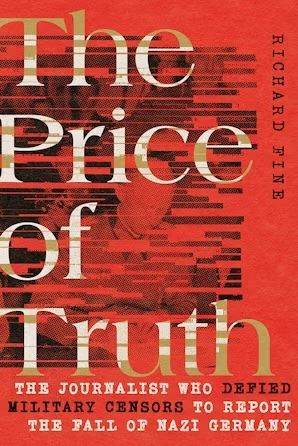By Richard Fine
On May 7, 1945, veteran Associated Press journalist Edward Kennedy bypassed military censorship to break the news of the German surrender he had just witnessed. He did so after authorities had prohibited release of the story for at least another day at the behest of their Russian allies. No action by an American correspondent during the entire war proved more controversial. His fellow reporters in Paris denounced him for what they termed “a deliberate, disgraceful and unethical double-cross.” The military stripped him of his credentials and ordered him back to New York. For weeks, commentators in the States either lauded him for reporting facts the public had every right to know or condemned him for a breach in ethics and for threatening military security. The Price of Truth details the surrender story controversy, then uses the episode to challenge the accepted view that the press’s relations with the military were amicable during World War II and only ran off the rails during the Vietnam War. When shorn of “Good War” nostalgia, media-military relations in World War II resemble those in Vietnam far more than most accounts would have it.
There is another more historiographic reason why this episode might speak to journalism historians even beyond those interested in how the press interacts with the military. While Ed Kennedy’s motivations and journalism ethics are central to the story, getting a sure sense of Kennedy’s character proved a challenge, one familiar to historians of all stripes. To begin with, there was little to go on—what documentary evidence exists largely centers on his thirteen years at the Associated Press. Beyond that, Kennedy was an intensely private person who did not much talk or write about himself, so private that his daughter only learned from an obscure document in the AP files uncovered decades after he died that Kennedy had been married at least once before he married her mother.
Moreover, there is conflicting testimony from those who knew him. Many journalists, including a number who worked with him, respected Kennedy’s professionalism and especially admired his steadfast opposition to excessive censorship. Others, notably some at other agencies, described him as tightly-wound and unscrupulous. While some colleagues noted Kennedy’s ability to function well under intense pressure, others thought Kennedy erratic.
While in Cairo, for example, Don Whitehead, then a young AP reporter, was shocked when Kennedy confided that he was in love with the wife of a correspondent then stationed in Teheran and that he was plotting to kidnap here and bring her to Egypt as his secretary. (I suspect that Kennedy was pulling the inexperienced Whitehead’s leg.) For another, one friend, Melvin Whiteleather, found him a “nervous wreck” at the end of the war, exhausted after supervising all AP operations in northwestern Europe. Others, though, considered him still to be functioning well despite his fatigue. There are also hints, but only hints, that Kennedy’s drinking was a problem, but if excessive drinking were a hanging offense, then the gallows would be crowded with war correspondents.
All of this to say that while Kennedy’s character remains opaque, what evidence exists very much leans toward Kennedy acting on principle in 1945. He sent the surrender story knowing full well what its personal cost would be. For the committee of journalists who campaigned a decade ago for Kennedy to receive a posthumous Pulitzer Prize, there was no question that Kennedy had done his professional duty in 1945 courageously. Kennedy proved an enigmatic subject, and brought home to me the truism that all history is conjecture, however well informed.
Richard Fine is a Professor Emeritus of the Department of English at Virginia Commonwealth University.

